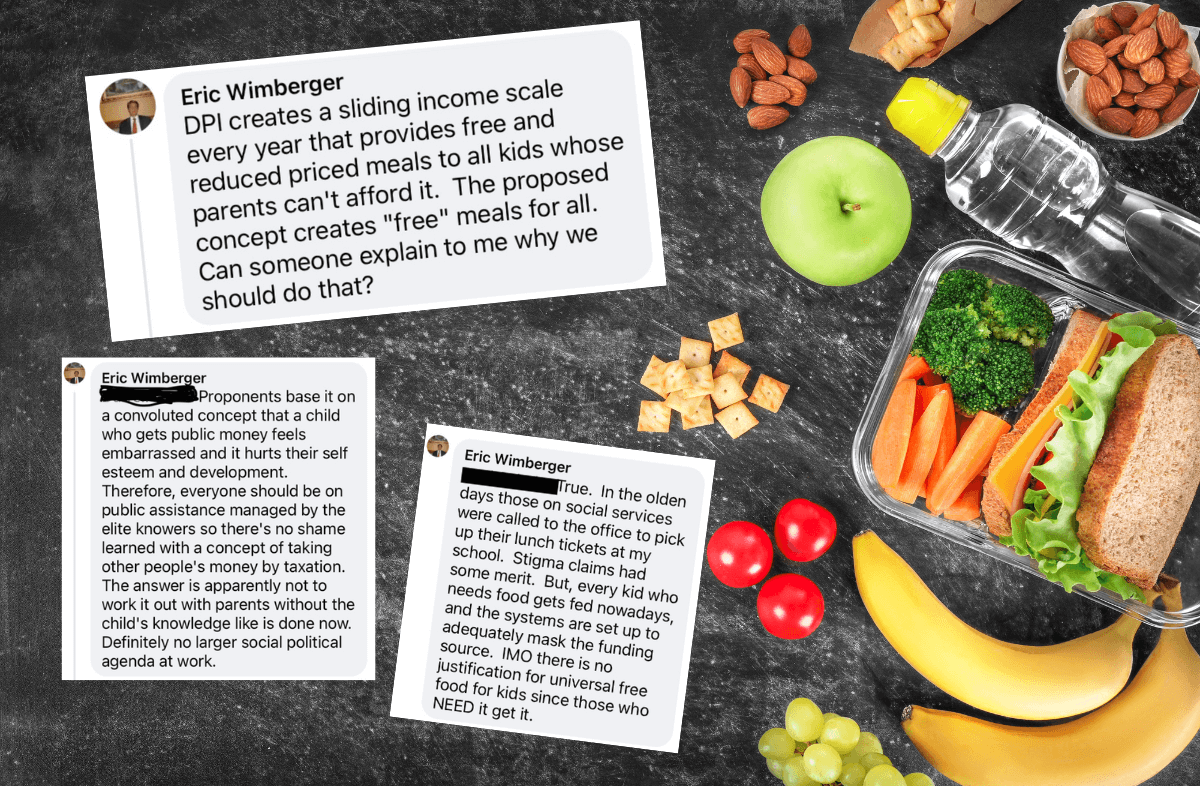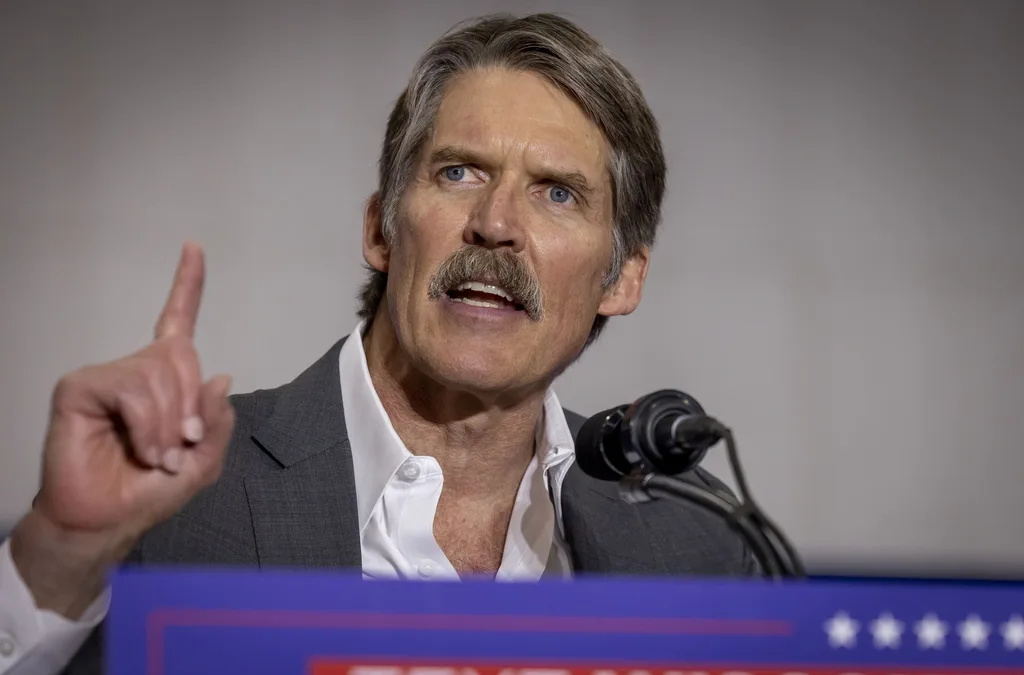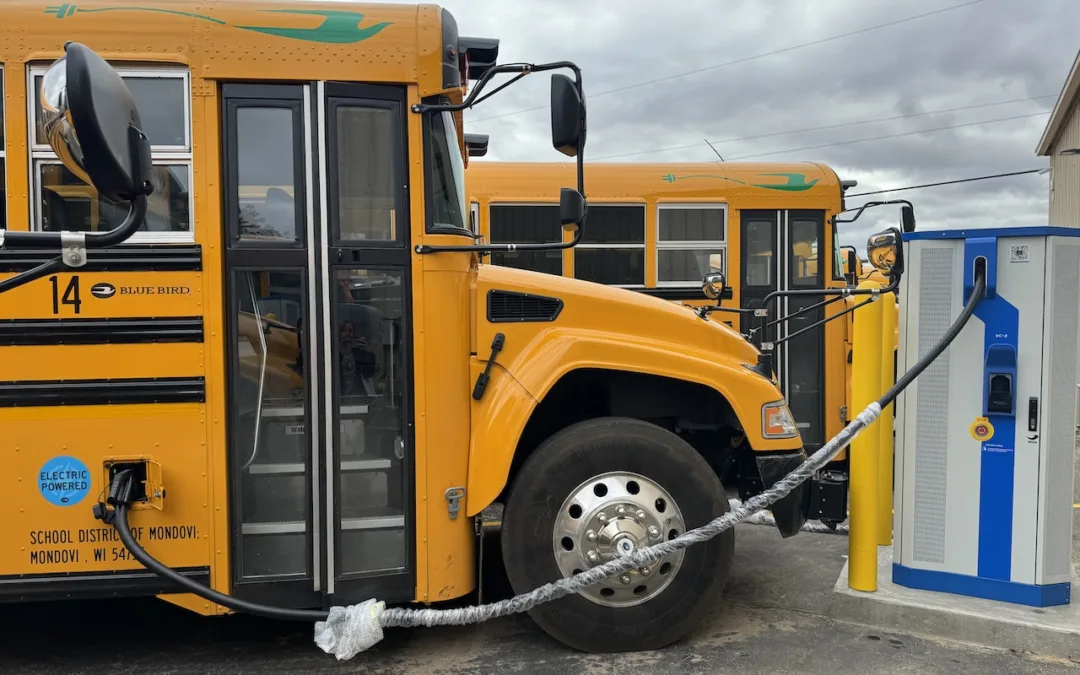
Facebook comments posted by state Sen. Eric Wimberger (R-Green Bay) as seen in an open letter from Rep. Kristina Shelton (D-Green Bay).
Rep. Kristina Shelton (D-Green Bay) said she noticed comments in a local Facebook group posted by Sen. Eric Wimberger (R-Green Bay) that questioned the need for a proposal like hers that would make school lunches and breakfasts available to every child, no matter their household income.
“Proponents base it on a convoluted concept,” Wimberger wrote in one comment, “that a child who gets public money feels embarrassed and it hurts their self esteem and development. Therefore, everyone should be on public assistance managed by elite knowers so there’s no shame learned with a concept of taking other people’s money by taxation. The answer is apparently not to work it out with the parents without the child’s knowledge like is done now. Definitely no larger social political agenda at work.”
Wimberger did not go into detail on who he considers to be “elite knowers”—be they educators, administrators, parents, or pediatric health experts who support balanced nutrition programs for children regardless of their parents’ or guardians’ level of wealth or poverty. Nor did he expound on the moral convictions that equate taxation with theft in the context of a social contract that benefits society.
As the author of the Healthy School Meals for All Act, Shelton felt compelled to respond to Wimberger and his conspiracy theory of a “larger social political agenda at work.” Her open letter follows.
Dear Senator Wimberger,
As legislators, our jobs are varied and complex. Of all the things I do in my day to support residents of the 90th, I did not expect to have to explain to my colleague why we should feed children. But here we are.
This year, I authored the Healthy School Meals for All Act. This bill would ensure that every student in Wisconsin has breakfast and lunch at no cost to their family. In response, you asked on Facebook “Can someone explain to me why we should do that?”
Beyond the obvious answer of “compassion” for the kids in our community, there are clear health, education, and economic arguments for supporting universal free school meals. I’m a teacher and a mom, so allow me to take you to school.
With kids heading back to classrooms in a few weeks, the back-to-school aisles in local stores are already picked over. Bookbags, pencil boxes, crayons, rulers… the list goes on. Parents sending kids to school know the challenges of getting these supplies that are essential for learning. But families should be prepared for an extra hurdle this year – ensuring their children have access to healthy school meals. This past June, the universal free school breakfast and lunch program Wisconsinites have come to know and rely on ended. This fall, schools are going backward, being forced to reimplement an archaic school meal program that turns a blind eye to a simple fact – healthy school meals are just as important to learning as books, pencils, and great teachers. Hungry kids can’t learn.
There are cultural, academic, economic, and administrative reasons why universal free meal programs are the right solution for all Wisconsin students.
Culturally, sharing universally available meals with all students creates a community of inclusion, care, and education. Food is a universal necessity that plays a key role in our relationships and wellbeing. The school lunch table acts as a unifier, bringing kids of all backgrounds together around a shared experience.
Academically, research shows that students perform better and eat healthier meals when they participate in school meal programs. There are connections to reductions in absenteeism, trips to the nurse, and poor behaviors.
Economically, higher school meal participation rates bring additional money into school nutrition programs and lowers the production cost per meal. With a higher rate of student participation, funding is available to invest in things like sourcing higher quality ingredients, expanding Farm to School, or increasing wages for food service workers. It’s an investment in local farmers and growers, too, and helps to shorten the supply chain by growing more Wisconsin-based products. Universal programs also support working families by eliminating lunch shaming and school meal debt.
The method of administering, completing, and collecting free and reduced meal applications is cumbersome, time-consuming, and intimidating. It mandates food service workers become de facto bill collectors. The current process also leaves too many kids between the cracks who don’t qualify but experience hunger and food insecurity.
Prior to serving in the legislature, I worked with school districts around the country on school breakfast and lunch programs. This is an issue that I know well, Senator. I could go on about the benefits of universal programs but I fear you’ve already made up your mind. You recently posted “IMO (in my opinion) there is no justification for universal free food for kids since those who need it, get it.”
Since the expansion of the universal meals program in March 2020, we’ve done something incredible that school meal champions were told was not possible – we fed all kids without questioning their families’ financial needs. Simply put – the expansion of the national school meal program has been transformative for schools, families, and communities.
Contrary to your public comments about the Healthy School Meal for All Act, there is no “larger social political agenda at work”. In fact, just the opposite. The Healthy School Meals for All coalition launched the bill in the Pulaski School District in November 2021. The bill is supported by groups as diverse as the Wisconsin Rural Schools Alliance, Wello, and the Wisconsin Council of Churches. Last month, the Ashwaubenon School District passed a resolution in support, urging lawmakers to take action. This isn’t a “leftist” or Democratic issue. The only question is whether or not we do the right thing for Wisconsin kids.
Still not convinced? The Healthy School Meals for All coalition invites you to our September monthly meeting to learn more. Your attendance will provide access to over 80 statewide member organizations who care passionately about kids, food, and local economies. For more information and to join our fight for School Meals for All Wisconsin, we invite you to visit our website schoolmealsforallwi.org
To continue the conversation around “why we should do that?”, please ask your Republican colleagues to have a committee hearing for the Healthy School Meals for All Act. Committee hearings are one of the best and most democratic ways to engage in critical issues such as this, bringing together and engaging with leaders and stakeholders in a public forum to engage in healthy, constructive dialogue.
Lastly, I’m inviting you to join me for lunch this fall at one of our local Green Bay public schools. If we’re going to talk lunch, then let’s eat lunch where it all happens, the school cafeteria.
I look forward to continuing the dialogue!
Sincerely,
Rep. Kristina Shelton
Politics

Eric Hovde’s company exposed workers to dangerous chemicals, OSHA reports say
A Madison-based real estate company run by Wisconsin US Senate candidate Eric Hovde settled with the Occupational Safety and Health Administration...

Plugged in: How one Wisconsin school bus driver likes his new electric bus
Electric school buses are gradually being rolled out across the state. They’re still big and yellow, but they’re not loud and don’t smell like...
Local News

Stop and smell these native Wisconsin flowers this Earth Day
Spring has sprung — and here in Wisconsin, the signs are everywhere! From warmer weather and longer days to birds returning to your backyard trees....

Your guide to the 2024 Blue Ox Music Festival in Eau Claire
Eau Claire and art go hand in hand. The city is home to a multitude of sculptures, murals, and music events — including several annual showcases,...





